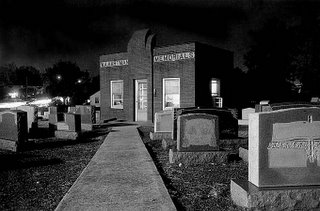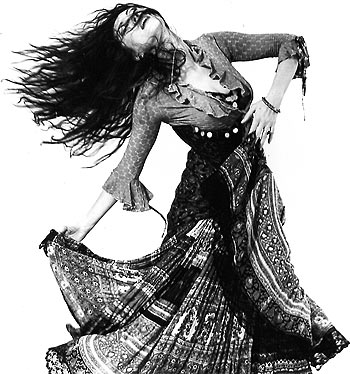
Several days a week, I go for a morning run at the Rivanna River Park on the outskirts of town. It is in the neighborhood of Woolen Mills, one of Charlottesville's more historic, yet lesser known areas. Once upon a time, Woolen Mills was a bustle of immigrant workers who came from all over, yet left little of themselves behind except for the oddly-constructed boarding houses in the area, which remain scattered throughout the hillsides in the now-gentrifying neighborhood. It was only in the latter moments of my undergraduate career at UVa, that I ventured away from the noise of the University nucleus, only to discover the quaint world of old Charlottesville, the places where students are seldom seen, and real people of the town go about their lives.
On the way to Woolen Mills, there's a very odd intersection. Across from the store with no name who's only sign reads "Mexican Products Sold Here", there's an entire plot of 50 or 60 gravestones. In the middle of the plot is a tiny brick building with "WA Hartman Memorials" squarely set in stone across the top fascia of the brick. For what it's worth, this has always been a very unsettling sight for me. The gravestones in the lot appear to be advertised like used cars. In my mind, I envision balloons rooted to last season's sale items, maybe even "buy one, get one free" sales, or even an on-going "discount to the undead" promotion. Places like that always make me wonder who shops there and what exactly are their purchasing objectives?
Perhaps because my values and subsequent views of life and death are largely due in part to the fact that my lifeview embodies that of modernity, I have a natural reticence to modern graveyards. I don't live and breathe on the soil of my ancestors, and when I allow myself to think in abstract with regard to my "final resting place", I have never once seriously considered that a large and expensive stone on top of me with my name on it is properly symbolic of my existence on the planet. As far as I'm concerned, cemeteries are an archaic throwback to the past of long-eclipsed pomp and circumstance. More importantly, they are a waste of precious land and material resources. If, after all, the body is a vessel, my desire is to be reincarnated through organ donation, and cremation seems like the most palatable organic approach I can imagine. Yes, put me back in the earth by planting me in a garden or giving me to the sea.
In today's world, we are largely devoid of the ancient sense of community and ritual, which was at once nurtured, needed, and represented in the symbolism of community burial grounds. Interestingly, as a young child, I was profoundly exposed to what these rituals mean. My grandparents were first-generation immigrants from that fantismal "Old Country". They unconsciously clung to some semblance of cultural identity despite the fact that their own ethnic inter-marriage was symbolic enough to prove that nothing about the evolution of an immigrant culture is ever permanently set in stone. Far from the land of their ancestors, they gave me and my brother what their parents and grandparents instilled in them: sanctified religious ritual based on the cycle of life and death.
I spent every summer with my grandparents. Every Sunday after Mass, we always spent the day visiting relatives. Interestingly, however, sometimes this meant changing our clothes and trekking to the old cemetery on the hill to replant the flowers upon the graves of those who came before us. I grew up in this cemetery. I played hide and seek with my brother while my grandparents planted and prayed aloud to the spirits in our midst. I spent afternoons holding my grandfather's hand as he toured me through the finer points of the cemetery microsm. It was where I learned who my great-grandparents were, and how they struggled to be Americans. When I grew older, I often ventured to the cemetery by myself, just to get a breath of air from noisy and stressful family gatherings. The cemetery overlooks the city, down to the river below, straight to the old steel mills on the water, where so many of the men and women buried on that hill spent their lives, including my grandfather, his brothers, cousins and friends.
I'll never forget the time after Mass one day when my grandfather insisted on driving up to the cemetery to show me and my brother the place where he and my grandmother chose to be buried. Instead of picking an old-fashioned plot with a double heart headstone like everyone before him, my grandfather opted for the new mausoleum, which was just being built at the time. He referred to it as the "high rise", and told us that this way no one would have to tend to his grave because, after all, he wouldn't be in the ground. I suppose my grandfather was looking out for all of us in his desire to minimize our efforts in maintaining his grave. I wondered if maybe he resented the fact that he had spent so much of his own life's energy tending to the graves of others. In my opinion, however, I don't think that he saw that the mausoleum approach to burial was (and remains) the first step of modernity's bastardization of human ritual. In my grandfather's defense, he didn't want us to have to work to visit him. However, now when I visit him, I'm also visiting a wall of 40 other dead degos, and I have to crane my neck up thirty feet just to see his name. Oddly enough, aren't cemeteries the place of life's affirmation? We use them as places to go and find silence and introspection, to commune at an organic level with the earth, energy, light, and air around us. Perhaps these are the last sacred places on man's earth. After all, the Amazon Rainforest will be long bulldozed, slashed and burned before my grandparent's cemetery is paved over for commercial use.
At any rate, even after all of these years, it appears as though WA Hartman Memorials is going strong. Yesterday, as I was coming back from my run, I saw two retirement aged couples milling around through the merchandise. They looked as intent as people shopping for mattresses.

No comments:
Post a Comment